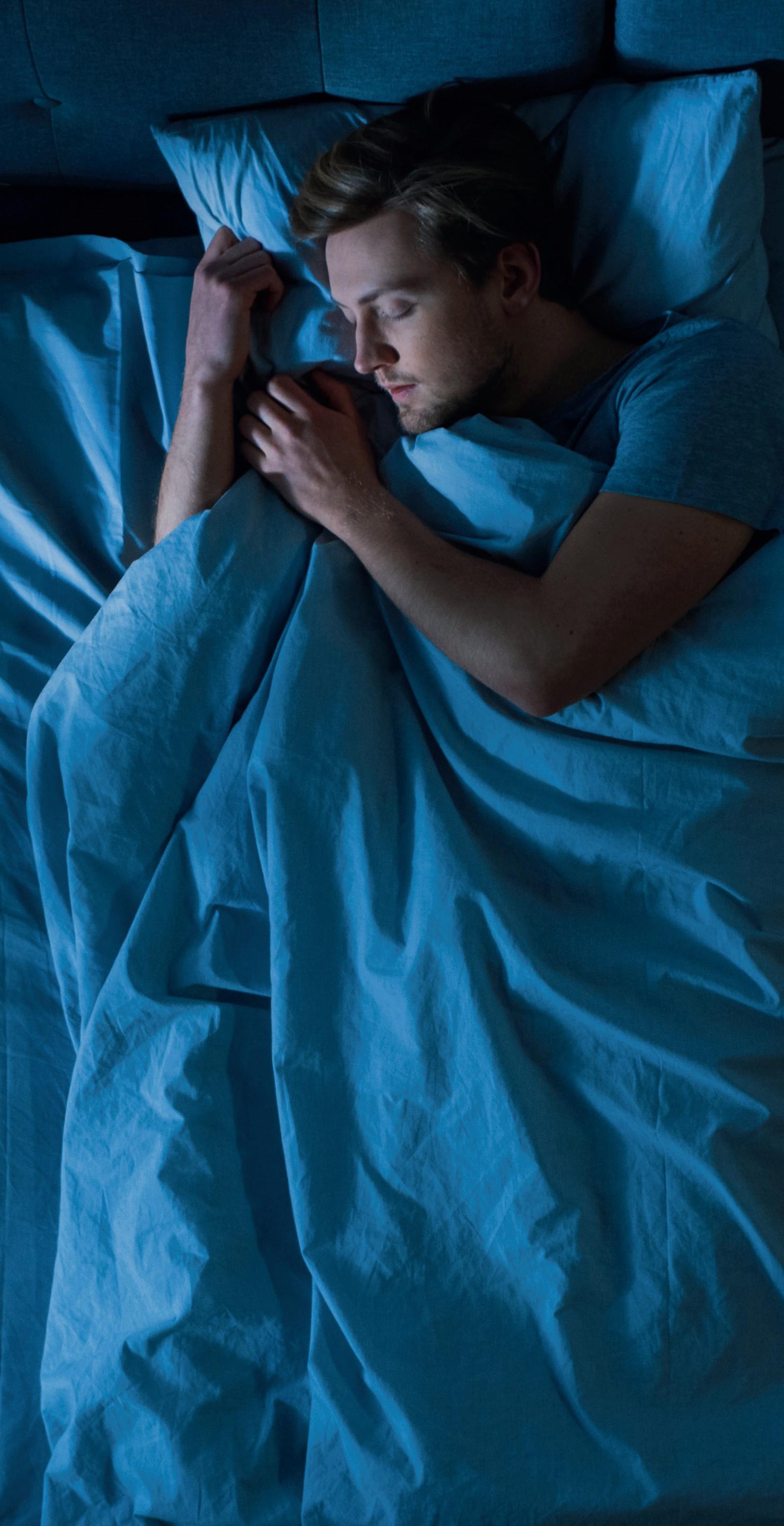We need to think of
as an essential part of






“Sleep is often overlooked as another fundamental of life.”
Professor

We need to think of
as an essential part of






“Sleep is often overlooked as another fundamental of life.”
Professor
The Sleep Charity estimates that 40% of the population will suffer from sleep issues, and most of those won’t seek support, which can lead to ongoing issues and undiagnosed sleep disorders.
listening to soothing music, reading or meditating. Don’t try to sleep; it needs to find you. Try to adopt a carefree, accepting attitude to wakefulness, and avoid clockwatching.
“Exposure to sunlight following sleep is not a problem during the summer but can become a problem in winter.”
Dr
“If you aren’t sleeping well, it can have a real impact on your mental wellbeing.”
What are sleep disorders?
Various sleep disorders impact sleep quality and daily functioning. Many can be identified by one or more of the following:
• Difficulty falling or staying asleep
• Struggling to stay awake during the day
• Imbalances in circadian rhythm, which disrupt a healthy sleep schedule
• Prone to unusual behaviours that disrupt sleep
Some common sleep disorders
• Insomnia: struggling with sleep for more than three nights a week, for longer than three months
• Delayed sleep phase syndrome (DSPS): misalignment between the body clock, local clock time and the light/dark cycle
How to look after our sleep
Try to wake up at a similar time and avoid lengthy lie-ins to strengthen the body clock. Where possible, expose yourself to natural light in the morning to suppress melatonin and boost alertness.
Consider what you do during the day that may impact sleep. For instance, if you are sensitive to caffeine, avoid it 8 hours before bed so it doesn’t interfere with sleep. Exercise is great for sleep and mental health, but try to do it earlier in the day rather than before bedtime.
Where possible, expose yourself to natural light in the morning to suppress melatonin and boost alertness.
• Sleep apnoea: pauses of breathing during the night
• Restless leg syndrome: tingling/crawling sensations in the leg when resting
• Narcolepsy: feeling excessive tiredness during the day
• Parasomnias: unusual behaviours during the night (sleepwalking, sleep talking, night terrors)
Lifestyle changes and sleep
Ensure your bedroom is conducive to sleep. A restful bedroom environment should ideally be cool, quiet, dark and free from distractions. Comfort — perhaps the bed or bedding — can significantly optimise sleep. Factor in a bedtime routine; aim to wind down at least an hour before bed. Do something you find relaxing, such as
When to contact a GP with sleep problems
If you’ve had difficulty with sleep for over four weeks and it’s affecting your wellbeing, you are experiencing excessive daytime sleepiness or your bed partner (if applicable) notices you snoring loudly and/or making gasping noises, make an appointment to see your GP.


Increasing numbers of us are dealing with the effects of insomnia. Learn some tips from Dr Ranj to improve your sleep health and increase your physical and mental wellbeing.
 DWRITTEN BY Tony Greenway
DWRITTEN BY Tony Greenway
uring Dr Ranj’s participation in Strictly Come Dancing in 2018, his professional dancing partner, Janette Manrara, had three expectations of him. “First, she wanted me to rehearse and give everything I could,” remembers Dr Ranj, who is also Sleep and Wellness Ambassador at retailer, Furniture Village. “Second, she wanted me to eat properly. Third, she wanted me to sleep — because whatever you’re doing, the likelihood is that you’ll do it better if you’ve slept well.”
Prioritise quality sleep for health
Dr Ranj’s advice: don’t scrimp on sleep. During sleep, our bodies repair tissue, rebalance hormones and promote growth, especially for younger people. Quality sleep boosts pain tolerance, strengthens immunity plus lowers risks of heart disease, stroke and cancer.
It also enhances mental performance crucial for learning and stress management. “There’s a misconception that sleep is when our bodies and brains switch off,” says Dr Ranj. “But, actually, it’s a very active process.”
Why many of us are having trouble sleeping
The trouble is increasing insomnia. In fact, according to a Furniture Village survey, 46% of us complain that we’re not getting enough sleep. The pace of modern life doesn’t help. “We try to fit more into our days than ever,” agrees Dr Ranj.
“This can spill over into our sleep time, making us stressed and anxious. Also, as a society, we’re collectively more stressed. We’re suffering from the after-effects of the pandemic, there are socio-political tensions and there’s a cost of living crisis. Plus, we’re on our screens a lot. Using them too close to bedtime is a mentally stimulating activity, and the light from the screens can interfere with sleep hormones.”
Manage stress, move more, practice mindfulness
However, there are things you can do to get better sleep. Ask yourself how you are dealing with stress — are you thriving, surviving or drowning? — and get help if you need it.
Also, start moving more. “When your physical health gets better, your sleep gets better and you feel better,” says Dr Ranj. “And — as I discovered from dancing — when you move, your muscles release chemicals that flow around your body and into your brain and have a direct antidepressant effect.” Additionally, there are mindfulness and breathing techniques you can use to calm the stress response and help you drift off.
When your physical health gets better, your sleep gets better and you feel better.
Better sleep environment for quality rest
Establish a good sleep routine with what Dr Ranj calls a ‘power down hour.’ That means no screens before bedtime and watching your caffeine intake. Your bedroom should be cool, calm, quiet and dark, with a comfortable pillow and mattress that signals to your body that it’s time to sleep. If your mattress is more than seven years old, consider changing it.
“Comfort is important to sleep quality,” notes Dr Ranj. “There’s a lot of technology that goes into mattress development, so whether you prefer a softer or firmer mattress, it’s worth going into a store to try before you buy — and talk to the retailer about what will be best for you. Go for the best your budget and space will allow because a mattress is an investment in your wellbeing.”
Don’t underestimate sleep and sleep issues
If you’re taking steps to improve your sleep but still having problems, see your GP, or speak to a trained sleep advisor. The Sleep Charity, in partnership with Furniture Village, offers a confidential National Sleep Helpline service. Dial 03303 530 541. Never underestimate the healing and revitalising power of sleep. “On TV, when I talk about being healthy, the first thing I’ll point to is the importance of diet and exercise,” says Dr Ranj. “But we shouldn’t forget that sleep is important too. We need to think of it as an essential part of life.”


Learn the science behind sleep. Personalise your routine based on your unique needs and chronotype to optimise sleep quality and overall health.
We need oxygen to breathe, food to eat and water to drink, but sleep is often overlooked as another fundamental of life. Sleep enables us to function on a day-to-day basis. Our physical, cognitive and emotional health also depend on getting sufficient sleep of the right quality.
How much sleep, and when should we sleep?
Sometimes, sleep needs are oversimplified — reduced to social media trends or a gimmicky solution. However, science tells us that there is no single answer to these two questions. We have individualised requirements for the sleep that we personally need, as well as the best timing for our sleep.
Embrace your chronotype for better sleep
Although sleep is essential for everyone, we are not identical sleepers, just as we are not the same in any other way.
‘Night owls’ begin to feel sleepy later in the evening and feel sleepy for longer into the morning. ‘Morning larks’ are the opposite; feeling sleepy earlier in the evening and waking earlier in the morning. To some extent, these chronotypes are ‘hard-wired,’ but they are not necessarily set forever: most teenagers are night owls, and we all become morning larks as we get older.


On the last Sunday of March, clocks in the UK will go forward. Sunrise and sunset will appear an hour later, marking the beginning of daylight saving time.
For centuries, time was defined locally, according to the position of the sun. This local mean time had one key advantage: it helped keep our circadian rhythms (body clocks) more closely aligned with the clock time.
Time zones impact on body
Railway timetables required consistent time across bigger distances and Greenwich Mean Time (GMT) was slowly adopted. A single national time zone results in later sunrises and sunsets in western regions and an increased desynchrony between our body clocks and the clock time.
Sleep/wake cycles, hormone release, temperature and metabolism, among others, operate on circadian rhythm. Our internal body clock runs on a slightly slower cycle and requires a daily reset through exposure to sunlight to stay on time.
Winter sunlight challenges circadian rhythms
Although sleep is essential for everyone, we are not identical sleepers, just as we are not the same in any other way. Consider even your shoe size. How do you know what it is? Did someone tell you? No, you always try shoes on because styles vary if you want a comfortable fit.
Find your best sleep fit
Personalising sleep is about experimenting, and World Sleep Day offers an opportunity for you to become your own scientist. How long do you need to be in bed to get enough sleep? You need to prioritise getting enough sleep; but if you are willing to take time to discover your best ‘sleep window,’ you will find your best sleep fit. Personalising is also about differences in our ‘circadian chronotype.’ That is, when is the best time for you to go to bed and get up?
Accept who you are and personalise your sleep by getting the sleep that you require — and when you require it. You will then find that the amount of sleep you need, and your experience of sleep quality, will begin to match up. The ‘5 principles’ of good sleep health can help you with more in-depth information.


WRITTEN BY
Professor Colin A Espie Professor of Sleep Medicine, Sir Jules Thorn Sleep & Circadian Neuroscience Institute, and Senior Research Fellow, Somerville College, University of Oxford
WRITTEN BY Professor Daniel J Smith
Chair of Psychiatry and Head of the Division of Psychiatry Centre for Clinical Brain Sciences, University of Edinburgh
Exposure to sunlight following sleep is not a problem during the summer but can become a problem in winter where sunrise occurs in London just after 8 am in late December and later than 8.45 am in Glasgow. With society still centred around a 9 am work/school start time, most people will have exposure to daylight and the chance to reset their internal clock before starting work.
Historically, Daylight Saving Time (DST) was designed to allow more waking hours spent in daylight and possibly productive work (especially outdoor/agricultural). With workforces and lifestyles increasingly based indoors, this is less of a consideration today.
The downside of clock changes is that they move all our activities by one hour overnight, including sleep, disrupting our circadian rhythms and impacting health (such as a 24% increase in heart attacks on the Monday after the clock changes).
Advocating for permanent GMT
One proposal to remove these twice-yearly circadian jolts has been to adopt permanent DST. While more light in the evenings and all-year ‘summertime’ sounds attractive, it would create a serious issue for the morning circadian reset. Workers in Glasgow, for example, may not see any sunlight at all during December days when the sun rises and sets while they are still at work.
Adopting permanent GMT would maintain morning daylight before work and ensure sufficient evening light during summer for outdoor activities to remain mostly unaffected.
The British Sleep Society advocates for permanently adopting GMT to enhance the UK’s health and wellbeing, mitigate the adverse effects of biannual clock changes and maintain stable sleep patterns year-round.
If our bodies have the right levels of magnesium — aka ‘nature’s tranquilliser’ — we will be able to relax more easily in the evening and feel more energised during the day.
 INTERVIEW WITH Lorna Driver-Davies Head of Nutrition, Wild Nutrition
WRITTEN BY Tony Greenway
INTERVIEW WITH Lorna Driver-Davies Head of Nutrition, Wild Nutrition
WRITTEN BY Tony Greenway

After a busy day, we should be tired and ready to relax. Yet, our brains can be flagging but our bodies may still feel tense and unable to sleep. Lorna Driver-Davies, Head of Nutrition at nutritional health company Wild Nutrition, calls this the ‘tired but wired’ effect of ‘always on’ modern living.
Magnesium as ‘nature’s tranquiliser’ Causes include overuse of screens (the blue light they emit blocks the production of melatonin, the hormone that regulates our circadian rhythms), eating at irregular times and over-reliance on stimulants such as coffee. “Then there’s stress,” she says. “If the stress we’ve built up
throughout the day is unreleased, our nervous systems and adrenal glands become over-stimulated, and it’s harder to feel calm.”
Relaxing is easier if our bodies have the right levels of magnesium, a mineral found in green leafy vegetables, meat, fish and whole grains. Magnesium is vital for the function of around 300 body processes, including soothing and supporting the nervous system — which is why it’s known as ‘nature’s tranquilliser’.
Calming the nervous system and helping bodies unwind
“Magnesium is clever because it will adapt to whatever we need, whenever we need it,” explains Driver-Davies.
Adopting permanent GMT would maintain morning daylight before work and ensure sufficient evening light during summer.
~Dr Alanna Hare and Dr Simon Durrant Presidents of British Sleep Society
“If you take a magnesium supplement in the evening, it calms the nervous system and helps you unwind, and it’s particularly good for relaxing the muscles.”
Taken in the morning, a magnesium supplement can help our energy levels. “Magnesium supports mitochondria function,” says Driver-Davies. “These are the energy factories in our cells, powering our bodies’ energy cycles. Energy isn’t the over-the-top stimulation we get from caffeine; it’s when we feel good in our skin and ready for the day. Magnesium can help with that: it’s very balancing.”
Benefits of natural magnesium supplements
Crucially, this can improve our outlook and mood. “If you are calmer and more positive, you are going to be more logical,” adds Driver-Davies. Unfortunately, for various reasons — including poor diet, soil depletion and modern standards of food production — our bodies don’t always get enough magnesium, which is why taking supplements can be useful.
Yet, not all magnesium is created equal, with 95% of the magnesium market synthetically derived. FoodGrown® is naturally sourced and presented to the body in food form, so your body recognises and welcomes it. It’s optimally absorbed, facilitating a better night’s rest. “If you have a better night, you’ll have a better day,” she concludes.

 WRITTEN BY Tristine Hargreaves Executive Director, National Bed Federation
WRITTEN BY Tristine Hargreaves Executive Director, National Bed Federation
in better sleep: why you need a comfortable bed and mattress
Upgrade your sleep with the right mattress that is comfortable for you. Discover how to choose the perfect bed for optimal rest, and bid farewell to sleepless nights.
The foundation of good sleep is a comfortable bed and the right mattress. It can be the difference between a restorative night’s sleep and poor-quality sleep that results in tiredness and fatigue.
A mattress’s life span is affected by several factors, such as the quality, care and amount you use it (eg. reading, watching TV and sleeping each night vs. occasional use of a spare bed). Changes in lifestyle (eg. marriage, new home) and in our bodies (losing or gaining weight, ageing, etc.) can also require a change of bed.
You still won’t get a refreshing night’s sleep if you’re sleeping on an old, unsupportive and unhygienic bed.
We spend around a third of our lives in bed, so if you’re having difficulty sleeping, one of the first things to look at is your bed. Research shows that an uncomfortable bed could rob you of up to an hour’s sleep.
You could be conscientiously following good sleep habits, like eating the right foods, exercising regularly, switching off gadgets before bedtime, winding down properly and sleeping in a cool, quiet and dark bedroom. However, you still won’t get a refreshing night’s sleep if you’re sleeping on an old, unsupportive and unhygienic bed.
Here are some helpful questions to determine if your bed is still suitable for you and if it’s time to think about getting a new one:
• Are you waking up more frequently, unrefreshed and aching?
• Do you disturb your partner, or are you disturbed by them when changing sleep positions?
• Does your mattress show signs of visible wear and tear (is it sagging, lumpy, etc.)?
• If it is sagging, do you and your partner roll towards each other unintentionally in the middle of the night?
• Did you have your best night’s sleep recently using another bed (eg. during a stay at a hotel)?
When you get your new bed, it will take some time to adjust and may feel strange at first, as your body will have become accustomed to sleeping on the old one, so be aware that your body may need a little time to adjust to your new bed.
If you’re having problems sleeping, you might be more likely to feel anxious or depressed.

EThere’s a close relationship between sleep and mental health. Living with a mental health problem can affect how well you sleep, and poor sleep can have a negative impact on your mental health.
veryone needs sleep, but many of us have problems with it. While having difficulties with sleep is not a mental health problem in itself — if you aren’t sleeping well, it can have a real impact on your mental wellbeing. Living with a mental health problem can also affect how well you sleep.
Issues with sleeping patterns
Common sleep problems include finding it hard to fall asleep, staying asleep or waking up earlier than you’d like to (if this is happening regularly, it may be known as insomnia; find out more on the NHS website).
You may also find it hard to wake up or get out of bed and often feel tired or sleepy — this could be because you’re not sleeping enough, not getting good quality sleep or because of health problems. You might experience problems that disturb your sleep, like nightmares and flashbacks. Or you might find that you’re sleeping too much, including at times when you want — or need — to be awake.
Not everyone who has a mental health problem will struggle with sleep, and not all people who struggle with sleep will develop mental health problems.
Connection between sleep and health
If you’re having problems sleeping, you might be more likely to feel anxious or depressed. You may struggle to concentrate or make plans and decisions. You might feel irritable, and you may find you’re more affected by other health problems, including mental health problems.
Jess D’Cruz, Information Content Manager at Mind, says: “We have long known that there is a link between sleep and mental health, though it’s very difficult to establish a causal relationship. Sleeping too much or too little can be a symptom of a mental health problem, while difficulties sleeping can affect our mental health.”
“Not everyone who has a mental health problem will struggle with sleep, and not all people who struggle with sleep will develop mental health problems. If you’re experiencing changes to your mental health or sleep that impact your day-to-day life or last more than two weeks, it’s always a good idea to seek support from your GP. You can also see some tips for improving your sleep on the Mind website. ”
 WRITTEN BY Jess D’Cruz Information Content Manager, Mind
WRITTEN BY Jess D’Cruz Information Content Manager, Mind
Our internal body clock runs on a slightly slower cycle and requires a daily reset through exposure to sunlight to stay on time.
~Dr Alanna Hare and Dr Simon Durrant Presidents of British Sleep Society
